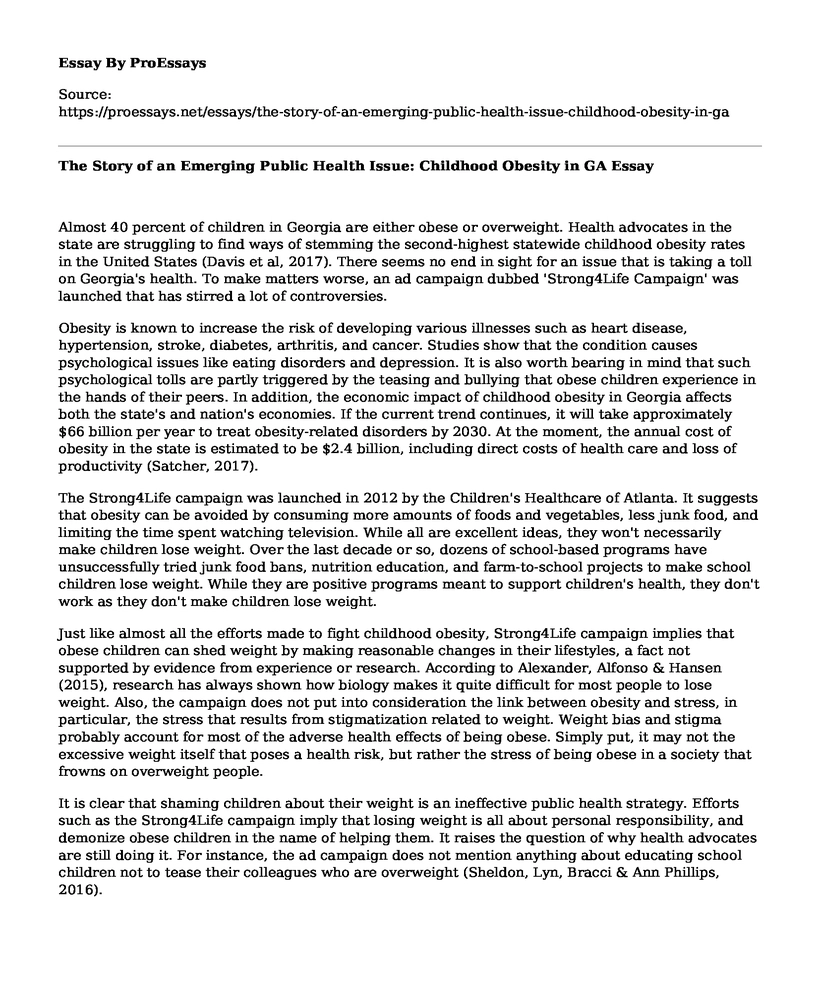Almost 40 percent of children in Georgia are either obese or overweight. Health advocates in the state are struggling to find ways of stemming the second-highest statewide childhood obesity rates in the United States (Davis et al, 2017). There seems no end in sight for an issue that is taking a toll on Georgia's health. To make matters worse, an ad campaign dubbed 'Strong4Life Campaign' was launched that has stirred a lot of controversies.
Obesity is known to increase the risk of developing various illnesses such as heart disease, hypertension, stroke, diabetes, arthritis, and cancer. Studies show that the condition causes psychological issues like eating disorders and depression. It is also worth bearing in mind that such psychological tolls are partly triggered by the teasing and bullying that obese children experience in the hands of their peers. In addition, the economic impact of childhood obesity in Georgia affects both the state's and nation's economies. If the current trend continues, it will take approximately $66 billion per year to treat obesity-related disorders by 2030. At the moment, the annual cost of obesity in the state is estimated to be $2.4 billion, including direct costs of health care and loss of productivity (Satcher, 2017).
The Strong4Life campaign was launched in 2012 by the Children's Healthcare of Atlanta. It suggests that obesity can be avoided by consuming more amounts of foods and vegetables, less junk food, and limiting the time spent watching television. While all are excellent ideas, they won't necessarily make children lose weight. Over the last decade or so, dozens of school-based programs have unsuccessfully tried junk food bans, nutrition education, and farm-to-school projects to make school children lose weight. While they are positive programs meant to support children's health, they don't work as they don't make children lose weight.
Just like almost all the efforts made to fight childhood obesity, Strong4Life campaign implies that obese children can shed weight by making reasonable changes in their lifestyles, a fact not supported by evidence from experience or research. According to Alexander, Alfonso & Hansen (2015), research has always shown how biology makes it quite difficult for most people to lose weight. Also, the campaign does not put into consideration the link between obesity and stress, in particular, the stress that results from stigmatization related to weight. Weight bias and stigma probably account for most of the adverse health effects of being obese. Simply put, it may not the excessive weight itself that poses a health risk, but rather the stress of being obese in a society that frowns on overweight people.
It is clear that shaming children about their weight is an ineffective public health strategy. Efforts such as the Strong4Life campaign imply that losing weight is all about personal responsibility, and demonize obese children in the name of helping them. It raises the question of why health advocates are still doing it. For instance, the ad campaign does not mention anything about educating school children not to tease their colleagues who are overweight (Sheldon, Lyn, Bracci & Ann Phillips, 2016).
Conclusion
To combat childhood obesity in Georgia, there need to be public health campaigns supported by experience and research. They should be framed around health rather than weight. The goal of such campaigns should be making all children healthier instead of trying to make those who are obese lose weight. It is not fully understood why some children in Georgia become obese while others do not. However, all children can benefit from exercising and eating well.
References
Alexander, D. S., Alfonso, M. L., & Hansen, A. R. (2015). Childhood obesity perceptions among African American caregivers in a rural Georgia community: A mixed methods approach. Journal of community health, 40(2), 367-378.
Davis, M., Still, C., Scarrow, A., McCarty, F., Christiana, R., Lewis, R., & Mullis, R. (2017). Using the Child as Change Agent for Preventing Childhood Obesity in Rural Georgia: Outcome Results on BMI for Age and Home Environment. Journal of Nutrition Education and Behavior, 49(7), S113.
Satcher, D. (2017). Childhood Obesity in Georgia. Public Health Reports, 132(2_suppl), 7S-8S.
Sheldon, E., Lyn, R., Bracci, L., & Ann Phillips, M. (2016). Community readiness for childhood obesity prevention: Findings from a statewide assessment in Georgia. Environment and Behavior, 48(1), 78-88.
Cite this page
The Story of an Emerging Public Health Issue: Childhood Obesity in GA. (2022, Jul 25). Retrieved from https://proessays.net/essays/the-story-of-an-emerging-public-health-issue-childhood-obesity-in-ga
If you are the original author of this essay and no longer wish to have it published on the ProEssays website, please click below to request its removal:
- "Nursing Preceptors Speak Out: An Empirical Study" - Article Analysis Essay
- Legalizing Marijuana is Harmful to the Americans Essay
- Paper Example on Postpartum: Best Advice for New Moms to Avoid Depression
- Essay Example on Ethical & Legal Implications in Nursing Practice
- Advantages of Electronic Health Records in Healthcare - Research Paper
- Sudan: North-Eastern African Nation of Arabian Migrants' Descendants - Essay Sample
- Research Paper Example: Addressing High Maternal Mortality & Morbidity in Developing Countries







